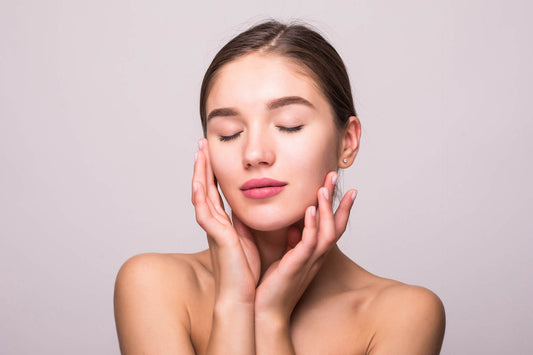For most people, hydration is the first ‘must-do’ when maintaining their skin's overall health and appearance. This is unsurprising, considering hydration is fundamental in regulating and protecting one's skin and maintaining a natural glow.
If you have a dedicated skincare routine, you’ll get most of your hydration from a good moisturizer. But how do you know if you have a good moisturizer that hydrates and benefits your skin?
Keep reading to learn the signs you’re already using the proper moisturizer for your skin type, indicators you may be using the wrong product, and how to know which moisturizer to incorporate into your routine.
Why Is Hydration Important For Healthy Skin?
Hydration is essential for healthy skin because skin loses its ability to produce elastin and collagen as you age.
As skin ages, its natural barrier function also deteriorates. This natural barrier helps skin retain moisture but begins breaking down because of a lack of water intake or environmental damage.
As such, it is essential to include a skin-specific moisturizer in your daily skincare regimen to retain and attract moisture and allow the skin to maintain its natural, youthful, and glowing appearance.
Read more: Fruit Stem Cells: How Nature’s Candy Is The Best Thing in Skincare
What Are The Indicators You’re Using The Wrong Moisturizer?
Finding the ideal moisturizer for your skin can be a challenge. However, consumers usually find it through trial and error, although this works differently for each person.
To help you avoid expensive trial and error, below are some indicators that you could be using the wrong moisturizer.
Excessive oil
If your skin feels greasy or oily to the touch after moisturizer application, this could be a sign you’re not using the proper moisturizer for your skin type. Depending on the season, you should consider switching moisturizers. For example, you may want to switch to a lightweight moisturizer in the summertime, and something more hydrating in the drier, cooler months.
Breakouts
If your moisturizer is causing breakouts, discontinue use immediately. Your skin could react adversely to one or more of the moisturizer's ingredients, and continuing to use the product will only worsen the breakouts.
Dry or Patchy Skin
A moisturizer prevents skin from drying out and allows for adequate skin hydration. If your moisturizer fails to hydrate your skin adequately, it may not be the right moisturizer for you. Look for moisturizers containing hyaluronic acid and ceramides, as these active ingredients help to retain and attract water, keeping skin moisturized.
Surface Redness and Irritation
If you’re using a moisturizer that causes a stinging or burning reaction, discontinue use. Stinging and burning sensations indicate the product is incompatible with your skin's pH. We recommend you always test a product by conducting a patch test before committing to the purchase.
Uneven Texture
If you notice any strange little white bumps on your skin or the skin feels rough or uneven after using a moisturizer, it is time to change the product immediately. Don't attempt to treat these white bumps on your own. Instead, speak with a certified dermatologist who can discover the cause and suggest a suitable replacement moisturizer.
Read more: Effective Acne Spot Treatments: What Works, What Doesn't & What's Right for You
What Are The Signs Of A Proper Moisturizer?
Wondering if your current moisturizer is getting the job done? Below are some of the telltale signs you’re using the proper moisturizer for your skin type.
Soothes Signs of Inflammation
If your skin is oily or dry, you could develop flakes, breakouts, or signs of eczema more frequently. So, finding a suitable moisturizer benefits the skin's overall hydration, keeping it balanced without a heavy, greasy feel.
Maintains a Healthy Glow
By maintaining a moisturizing routine, you can improve the overall appearance and texture, thus benefiting the vibrancy and health of your skin.
Prevents Dryness
Environmental factors like frosty air or blazing heat, frequent washing, or the hot showers you love could lead skin to dry skin and other skin-related issues. So, using the right moisturizer to minimize the impacts of environmental factors is necessary for healthy skin.
Encourages Faster Cell Turnover
Depending on its active ingredients, the proper moisturizer can help speed up cell turnover and improve cell function. So, if your skin is glowing and feeling better than usual, it could be a sign that the moisturizer is doing its job.
Protection Against UV Rays
Using a good moisturizer as part of your skincare routine can help protect and repair the skin, prevent damage from UV rays, and protect against damage from other environmental forces.
Read more: 5-Minute Skincare Routine for Busy Young Adults
Tips For Finding The Best Moisturizer For Your Skin
Now that you know the signs of using the proper moisturizer, it’s time to find the one to help you achieve your skin goals. Keep these tips in mind as you’re shopping for the right moisturizer for your skin:
Consider your skin type: When purchasing a moisturizer, ask yourself, “Do you have normal, dry, oily, or a combination of skin types?” “Do you have sensitive or acne-prone skin?” The answers to these important questions will determine the type of moisturizer you choose since most products are formulated for varying skin types.
Check the scent of the moisturizer: Avoiding scented moisturizers with perfumes, artificial fragrances, and harsh essential oils is often essential, especially if you have sensitive or acne-prone skin.
Read the moisturizer label: Reading the label on any skincare product can often be unintelligible, yet you can discover much about the product from reading it closely. Always look for moisturizers labeled “non-comedogenic” (lower likelihood of clogging pores) and “allergy tested” (less likely to cause allergic reactions). But, it is essential to note that even with these labels, you can't guarantee that the product won't irritate or damage your skin, so always conduct a small spot test before applying to your entire face.
Use moisturizers formulated with SPF: Regular sunscreen use is an essential step in a hydrating skincare routine. Thanks to sunscreen, combating the adverse effects of the sun is simple, so choose a moisturizer with an added SPF rating of 15 or higher and use it daily.
Finding the Proper Moisturizer: A Review
Finding the right moisturizer for your skin type depends on various factors, including skin type, skin conditions, target areas, and more. There isn’t a one-size-fits-all moisturizer for everyone, but now that you’re armed with the proper information on which ones to shop and skip, the right one could be just a click away.
Contact the Vieve’s Leaves team today to learn more about our bestselling products and services to help build your ideal skincare routine.




